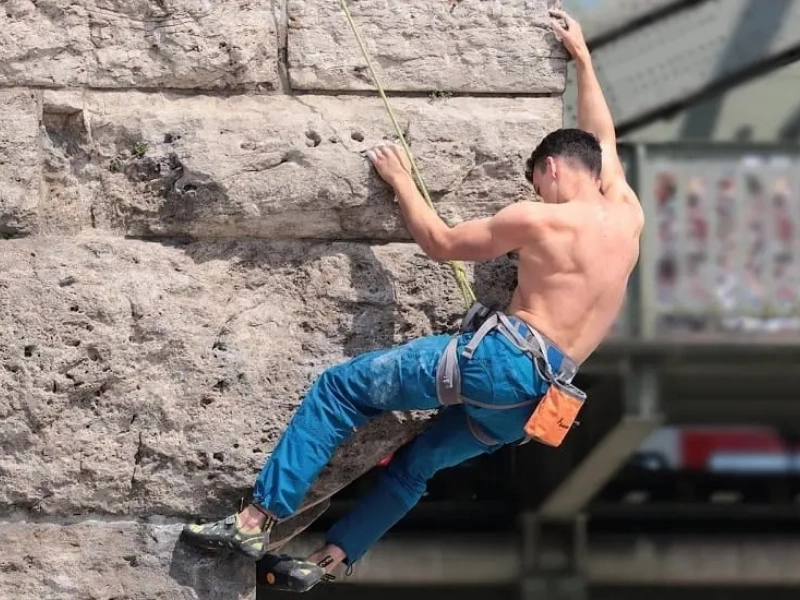In rock climbing performance, the ratio of strength to weight is crucial. But there appears to be a propensity to ignore the weight component of the equation in favour of focusing just on the strength side. Expert climbers typically weigh extremely little and have low body fat percentages, according to numerous studies. But does this actually improve their climbing abilities?

 A climber's physique should be muscular and slender, but not large. To survive the rigours of the sport, this build is required. To get past barriers and climb the wall, climbers need to be strong and nimble. A balanced diet and frequent exercise are necessary to reach this goal. Consuming 1.2–1.8 grammes of protein per kilogramme of body weight per day will help you reach this goal. Including long-distance running in your exercise regimen is also a smart option.
It's crucial to remember that not all climbers are inherently fit and slender. Their training regimen, past athletic experience, and genetics can all affect how much muscle mass they possess. For climbers, big muscles in the wrong areas can be just as detrimental as extra fat.
Climbers may suffer if weight loss is given too much attention. Relative energy shortages in sports and eating disorders can result from it (RED-S). Red-S poses a serious risk to climbing efficiency.
A climber's physique should be muscular and slender, but not large. To survive the rigours of the sport, this build is required. To get past barriers and climb the wall, climbers need to be strong and nimble. A balanced diet and frequent exercise are necessary to reach this goal. Consuming 1.2–1.8 grammes of protein per kilogramme of body weight per day will help you reach this goal. Including long-distance running in your exercise regimen is also a smart option.
It's crucial to remember that not all climbers are inherently fit and slender. Their training regimen, past athletic experience, and genetics can all affect how much muscle mass they possess. For climbers, big muscles in the wrong areas can be just as detrimental as extra fat.
Climbers may suffer if weight loss is given too much attention. Relative energy shortages in sports and eating disorders can result from it (RED-S). Red-S poses a serious risk to climbing efficiency.
 Taller climbers typically have an advantage over shorter climbers; however, muscular mass and body fat have a greater impact on a person's climbing capacity than height. The best climbers in the world tend to be quite skinny. This is a result of their daily physical training as athletes. It's crucial to keep in mind, though, that being very thin can be harmful and lead to eating problems. Knowing the early indicators of an eating disorder is crucial, as is getting treatment if you believe you may be experiencing them.
It's also critical to remember that climbing is a gravity-based activity and that the harder you try to climb, the heavier you must be. Climbers need to reduce their weight as much as possible because of this. That being said, a lot of climbers manage to make the most difficult climbs look easy despite having beer guts.
Taller climbers typically have an advantage over shorter climbers; however, muscular mass and body fat have a greater impact on a person's climbing capacity than height. The best climbers in the world tend to be quite skinny. This is a result of their daily physical training as athletes. It's crucial to keep in mind, though, that being very thin can be harmful and lead to eating problems. Knowing the early indicators of an eating disorder is crucial, as is getting treatment if you believe you may be experiencing them.
It's also critical to remember that climbing is a gravity-based activity and that the harder you try to climb, the heavier you must be. Climbers need to reduce their weight as much as possible because of this. That being said, a lot of climbers manage to make the most difficult climbs look easy despite having beer guts.
 For rock climbers, being too heavy to climb might be a serious issue. The best climbers are typically small in size and have a low body mass index. The rationale is that research looking at the relationship between climbing ability and handgrip strength has shown that climbing performance is extremely strongly connected to body weight (Giles et al., 2006).
A climber should have a lean, toned body with enough strength to tackle challenging routes and overhangs. Achieving this combo is not simple. Climbers should follow a balanced diet in addition to their normal workout regimen. Losing weight can be facilitated by eating a diet high in lean protein and low in fat and carbohydrates.
It is also important for climbers to reduce their surplus muscular mass. Just as much of an adverse effect on climbing performance can be caused by extra muscle weight as by excess fat. Big muscles can restrict joint range of motion and cause unsteadiness when balancing on a wall. An individual's level of muscle weight can be influenced by genetics, past athletic endeavours, and training techniques.
For rock climbers, being too heavy to climb might be a serious issue. The best climbers are typically small in size and have a low body mass index. The rationale is that research looking at the relationship between climbing ability and handgrip strength has shown that climbing performance is extremely strongly connected to body weight (Giles et al., 2006).
A climber should have a lean, toned body with enough strength to tackle challenging routes and overhangs. Achieving this combo is not simple. Climbers should follow a balanced diet in addition to their normal workout regimen. Losing weight can be facilitated by eating a diet high in lean protein and low in fat and carbohydrates.
It is also important for climbers to reduce their surplus muscular mass. Just as much of an adverse effect on climbing performance can be caused by extra muscle weight as by excess fat. Big muscles can restrict joint range of motion and cause unsteadiness when balancing on a wall. An individual's level of muscle weight can be influenced by genetics, past athletic endeavours, and training techniques.